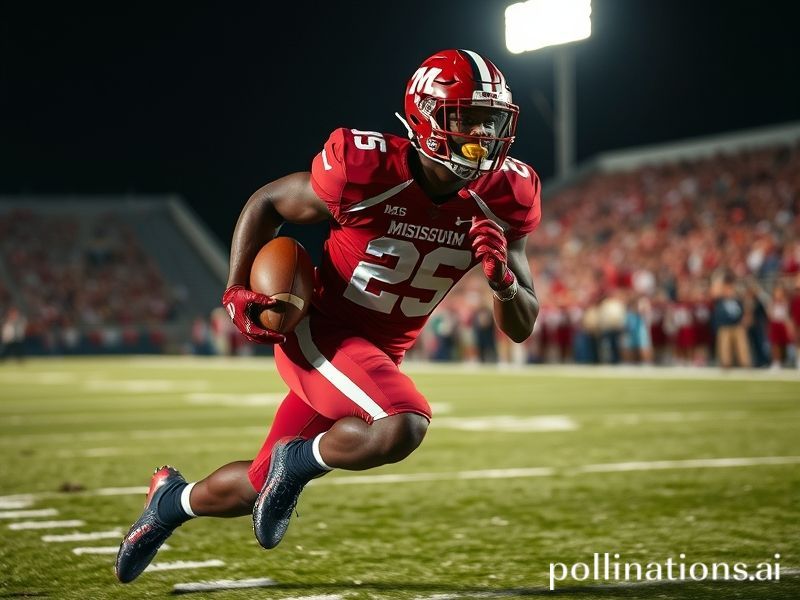Quinshon Judkins: How a College Transfer Just Shifted Global Power (and Jersey Sales)
Quinshon Judkins and the Geopolitics of a 40-Time
By the time Quinshon Judkins, Mississippi-bred running back with thighs that could embargo a small shipping lane, announced his transfer to Ohio State, the tremor was felt from Lagos to Luxembourg. Not because anyone in Lagos can immediately locate Starkville on a map (they can’t; most Americans can’t), but because the modern sports-industrial complex has become our planet’s most efficient exporter of distilled national myth. One 19-year-old relocating his talents northward is, on paper, a minor clerical move in the NCAA’s ledger of indentured celebrity. In practice, it is a miniature trade war—tariffs levied in broken dreams, GDP measured in jersey sales.
Judkins’ sophomore highlight reel already circulates on encrypted Algerian fan channels beside grainy footage of past African sprint kings. Why? Because in the global marketplace of vicarious glory, a 220-pound sophomore who breaks tackles like the International Monetary Fund breaks economies is universally legible. His jukes are a lingua franca; his stiff-arm, a diplomatic communique that needs no translation. When he opts for Columbus over Tuscaloosa, it registers in Nairobi sports bars the way a Federal Reserve rate hike registers on Asian exchanges: mysterious, remote, yet somehow responsible for tomorrow’s price of beer.
Of course, the NCAA insists this is an “amateur” decision, which is adorable—like calling the Arctic a “chilly pond.” European football clubs have spent decades perfecting the art of extracting teenage phenoms from Senegal and Brazil, but at least they pay transfer fees vulgar enough to make oligarchs blush. The American model prefers moral pieties and bag men in parking lots, a system so brazenly feudal that even Vladimir Putin’s talent scouts file it under “aspirational.” Judkins, meanwhile, receives the standard compensation package: room, board, and the faint promise that his knees will still function after he’s generated eight-figure revenues for people who spell his name wrong in emails.
The worldwide implications? Consider soft power. Every time a kid in Manila streams a Buckeyes game at 3 a.m. to watch Judkins punish Michigan linebackers, another sliver of U.S. cultural hegemony slides into place—cheaper than an aircraft carrier, and with better theme music. The State Department doesn’t calculate it, but maybe it should: ESPN’s college football export value rivals Boeing’s quarterly reports. Meanwhile, Chinese streaming platforms bid for rights, Nigerian tailors knock off scarlet jerseys, and German data-mining firms tweak algorithms to serve Judkins-themed gambling pop-ups to insomniac Düsseldorf accountants. Globalization, like a linebacker, hits everyone eventually.
There’s a darker calculus, too. Judkins’ body—its ligaments, cartilage, and future—represents a futures contract traded in real time. European bookmakers already post over/under lines on his NFL draft position; crypto bros mint NFTs of his signature touchdown pose. Somewhere in a dimly lit London trading floor, a hedge-fund analyst adjusts risk models on athlete longevity the way he once did on Greek sovereign debt. The kid thinks he’s picking a school; the market sees a collateralized highlight obligation.
And yet, amid this carnival of capital, something stubbornly human persists. Watch the clip again: Judkins high-steps through a linebacker, then glances toward the sideline—not for the camera, but for his mother. That glance is the same whether you’re in Jackson, Mississippi or Jakarta: the reflexive search for the face that kept the lights on, that kept hope limping along when the world felt third-world in its indifference. It’s the one moment the algorithm hasn’t monetized—yet.
So when Judkins takes the field this autumn in Ohio Stadium—renamed, surely, by then for some cryptocurrency exchange—remember you’re not merely watching football. You’re witnessing the latest iteration of empire: cheaper than colonialism, more entertaining than a trade war, and packaged in HD for your sleepy Sunday morning in Singapore. The final score will scroll across screens from Reykjavík to Riyadh, and somewhere a weary diplomat will mutter that if only border disputes could be settled by 40-yard dashes, we’d all sleep better. Until then, we have Quinshon Judkins, running like tomorrow’s balance of payments depends on it. Because, in a way, it does.







